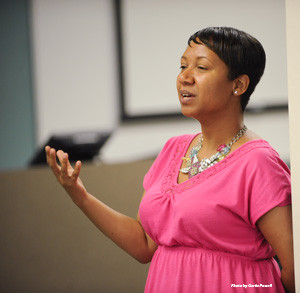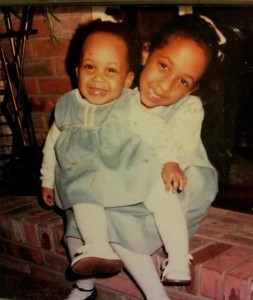Spelman College’s history is both deep and rich. Since 1881, the premier historically black college for women of African descent has documented its history. Holly A. Smith is a graduate of William and Mary College and Yale University. Her background is in public history, library science and archives and prior to working at Spelman worked at the University of North Carolina, Chapel Hill in special collections.
In an interview with Smith, she shares how as an adolescent girl she developed her love for history, what lead her to a career of preserving history and what it’s like being the Archivist to Spelman.
When did your fascination with archiving begin? As a child, did you ever find yourself archiving anything? (i.e., a grade level or approximate age)
To be honest, I didn’t know anything about archiving until I was much older. I first had an interest in history, particularly African American history, from working in Colonial Williamsburg, a public history site in Williamsburg, Virginia. I began working as a youth interpreter at age eight in the African American Programs Department, where we learned African stories, how to play African instruments, and the overall history of colonial Virginia. I was amazed to learn that over half the population in Colonial Williamsburg were enslaved people or free people of color, so I felt very passionately about sharing this history with all the visitors that came. My experience at Colonial Williamsburg laid the foundation for my love of history, research, and primary documents.
What served as the steppingstone(s) to your career in the archival field?
In 2003, after graduating from my masters program in History, I started working for Boston National Historical Park in the Cultural Resources Department. I began thinking about what kind of career I wanted to pursue, so I set up meetings to talk with professionals in areas I was interested in – cultural heritage, libraries, museums, and public history. I became very interested in archives after meeting several professionals and learning I could combine my interests in history and research with my desire to work with the public. I felt like being an archivist would offer me the broadest possible career path, so I enrolled in Simmons College’s School of Library and Information Science. The program gave me great academic and practical working experience.
If you could pick a time in history where you would have liked to live based on the richness of its archival materials, which time period would it be?
The photographs, literature, music and culture of the Harlem Renaissance in the 1920s is especially rich. I especially enjoy reading the rich stories and essays by iconic writers of that time like Zora Neale Hurston and Langston Hughes.
You came to Spelman from the University of North Carolina at Chapel Hill, what drew you to the Spelman Archives?
Before I came to Atlanta, I knew of Spelman’s excellent academic reputation and historic importance in terms of educating women of the African Diaspora. I felt the archives would be a rich reflection of the College’s history and the community that built Spelman into the iconic institution it is today. I was also excited the Archives is part of the Women’s Resource and Research Center, and also collected materials related to black women and feminism, LGBTQ advocacy, civil rights and social justice. These special collections combined with the institutional archives make for vastly rich resources!
What does a typical day or week entail being the Archivist?
Most people might be surprised as all the activities an archivist can do. The Archives gets a lot of reference requests from Spelman staff as well as outside researchers. The requests range from looking for information on an ancestor who attended Spelman to assistance understanding the campus’s architecture. My colleague and I also assist researchers who come to the Archives and want to use the collections. We work with teachers to create assignments for their students, and lead archival instruction sessions for the students. In addition, the Archives staff tackles interesting special projects, like planning exhibits and public programs. I really enjoy the variety of work in my job because it differs so much day to day.
What is the most rewarding part about being an Archivist? And what is the most rewarding part being a Spelman Archivist?
I love working with diverse groups of people – students, faculty, staff, the outside community – and talking about the importance of keeping archives that tell our collective stories. I always wanted to focus on preserving materials related to African American history and culture, so I am especially honored, humbled and excited to help preserve Spelman’s amazing collections.
Do you believe the richness of the Spelman‚Äôs Archives attributable to Spelman’s interdisciplinary view of the arts or to the overarching liberal arts framework of a Spelman education‚Äîor to both?
I would say both – looking at the course catalogs, publications, and institutional archives, you get a sense of the college’s rich curriculum over time. The archival collections provide a window into the structure of the university and how the college has managed to produce amazing, intellectual women over its 134 year existence.
Can you give us an overview of one of your favorite collections?
I love the Spelman Photographic Collection – there are literally thousands of images that document Spelman and the campus community from the founding in 1881 to the present. I really enjoy seeing class photos from the 1900s and think of the similarities and differences with present day students. I think they are a beautiful visual story of the college and provide such wonderful detail.
How does it make you feel knowing that you have continue to build a space that connects researchers, on campus and across the world with the materials we hold in the Spelman archives?
I feel honored and humbled to help preserve this important history and provide access to these rich collections to diverse communities. Often women and people of color are marginalized in the written historical records, so I feel passionate about advocating for Spelman Archives to broad audiences and encouraging use of our materials.
What’s the most surprising or interesting thing people probably didn’t think was in the Archives?
We have the papers of lesbian feminist activist Audre Lorde at Spelman, and in addition to her papers, we also have several artifacts of hers – including clothing she wore and locks of hair. People might think it’s odd to have textiles and objects in the Archives, but I think it’s important to have collections that show the breadth, diversity, and complexity of people’s lives. The items we have in the Archives belonged to real people, and I think it’s important to maintain that human connection to the inanimate objects and flat papers researchers look at.
A component of the Women’s Research and Resource Center, the archives is open Monday through Friday, 10 a.m. until 4:30 p.m. Research in the archives is scheduled by appointment only and serves faculty, staff, students, alumnae, the Atlanta University Center, scholars, researchers and the general public.
-Danyelle R. Carter
Junior Girl
Girl Museum Inc.


